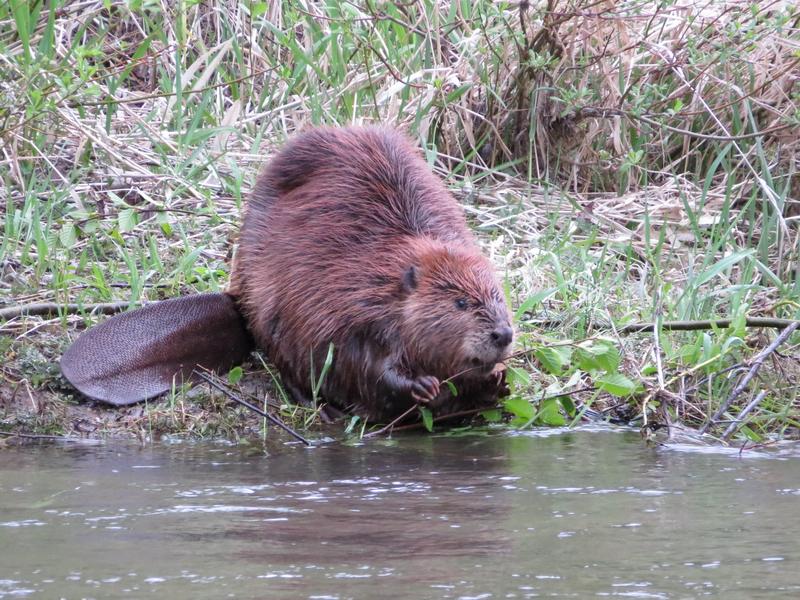
Photo by: Laura Rodgers WDFW
We are awarding more than $650,000 in grants to fund 14 projects that will significantly improve water quality and the natural environment in multiple watersheds across the state. There are seven projects in Eastern Washington and seven in Western Washington.
Beginning May 1, the grants will pay for a variety of projects aimed at:
- Restoring and enhancing rivers, floodplains, and salmon habitat.
- Providing public outreach and education.
- Removing invasive plant species and installing native vegetation to restore stream banks and control erosion.
- Building watersheds that are more resilient to climate change.
- Helping respond to an environmental emergency.
The grants are funded through Ecology’s Terry Husseman Account from penalties we issue for violations of the state Water Pollution Control Act. The account is designed to help local and Tribal governments, conservation and port districts, fisheries enhancement groups, and other state agencies pay for environmental projects.
The account is named after long-time Ecology deputy director Terry Husseman who died in 1998 and honors contributions in the field of environmental management.
Ecology evaluated 17 different project proposals worth nearly $760,000. The department scored each proposal’s expected environmental benefits, local support and involvement, budget and cost effectiveness, readiness to proceed, and project schedule. Environmental justice and climate change were part of the evaluation criteria.
Eastern Washington projects
Benton Conservation District will receive $36,229 to restore a historic side channel of the Yakima River by replacing invasive species with native vegetation. This project will reduce excessive water temperatures in the summer and strengthen the floodplain for increased stream flows through the side channel.
Cascade Columbia Fisheries Enhancement Group will use $43,550 to improve water quality and promote community engagement at six sites in the Methow, Wenatchee, and Okanogan river basins. This grant will support riparian planting at Mack Lloyd Park in Winthrop, riparian planting on Omak Creek on land within the Confederated Tribes of the Colville Reservation, develop a riparian plant guide, support volunteer planting and maintenance at Mazama Park as well as planting and stewardship activities at the Lower Sleepy Hollow Preserve on the Wenatchee River.
Mid-Columbia Fisheries Enhancement Group is getting funding for two projects. The fisheries enhancement group will receive $49,944 to establish a new riparian forest along lower Cowiche Creek. This project will ensure survival of previous plantings to improve water quality and habitat and supports stewardship work near Yakima.
The organization is also receiving $49,950 for the Wilson Creek Riparian Buffer Demonstration project in Kittitas County to remove invasive crack willow from the creek, plant a streamside buffer and reduce bank erosion. This small-scale project will help demonstrate the benefits of riparian buffers.
Spokane Conservation District is receiving $50,000 to stabilize and restore the stream bank along Deadman Creek. The project will address active erosion, restore riparian buffer and habitat, and reconnect the floodplain.
Walla Walla County Conservation District is getting funding for two projects. The conservation district will use $49,750 to respond to an environmental emergency at Mill Creek. During the historic February 2020 flood, a house was washed toward the Mill Creek stream channel. This project will remove debris, including a refrigerator, foam, and assorted construction materials before they fall into the creek.
The conservation district will also use a $44,308 grant to reduce erosion and increase riparian plantings on Dry Creek. This project will install pilings along the toe of the bank and plant native vegetation.
Western Washington
Mid Sound Fisheries Enhancement Group is receiving $50,000 for the Rose Point embayment restoration project in Kitsap County to restore a historic estuary and remove a creosote piling bulkhead on private properties at Rose Point near Eglon.
Snohomish Conservation District is receiving $49,262 to improve water quality by planting and maintaining a riparian forest buffer along the Snohomish River.
Clark Conservation District will use a $49,861 grant to support Poop Smart Clark, a program that reduces and prevents fecal bacterial pollution through source identification, targeted outreach, and voluntarily implementing best management practices. Funding will support existing outreach efforts, connect residents with program resources and create behavior change.
Clark Public Utility District is getting $49,895 to enhance streamside habitat in Rock Creek. This project will improve water quality and enhance wildlife habitat by planting native trees and shrubs to increase stream shade, boost stream flows and stormwater infiltration, and reduce turbidity. This project will help increase public awareness and provide volunteer stewardship opportunities.
Clallam County will use a $29,000 grant to conduct a training workshop focused on coexisting with beavers. This project will focus on beaver benefits to the Dungeness River watershed and coexistence with area landowners. The workshop will also include learning new, nonlethal techniques for beaver management, and presentation for community education.
Underwood Conservation District will receive $50,000 to expand an existing geospatial database to improve natural resource management, expand public engagement, and boost ecosystem resilience to climate change. This project will establish more effective, targeted watershed restoration and management for watersheds in Skamania County and western Klickitat County.


